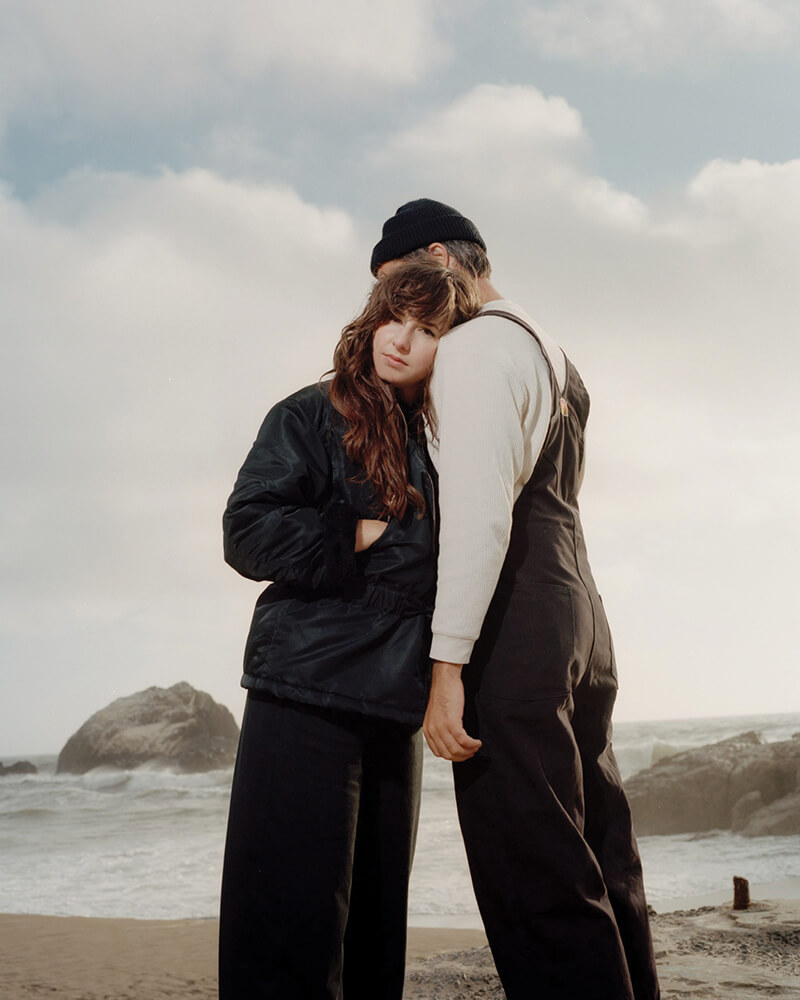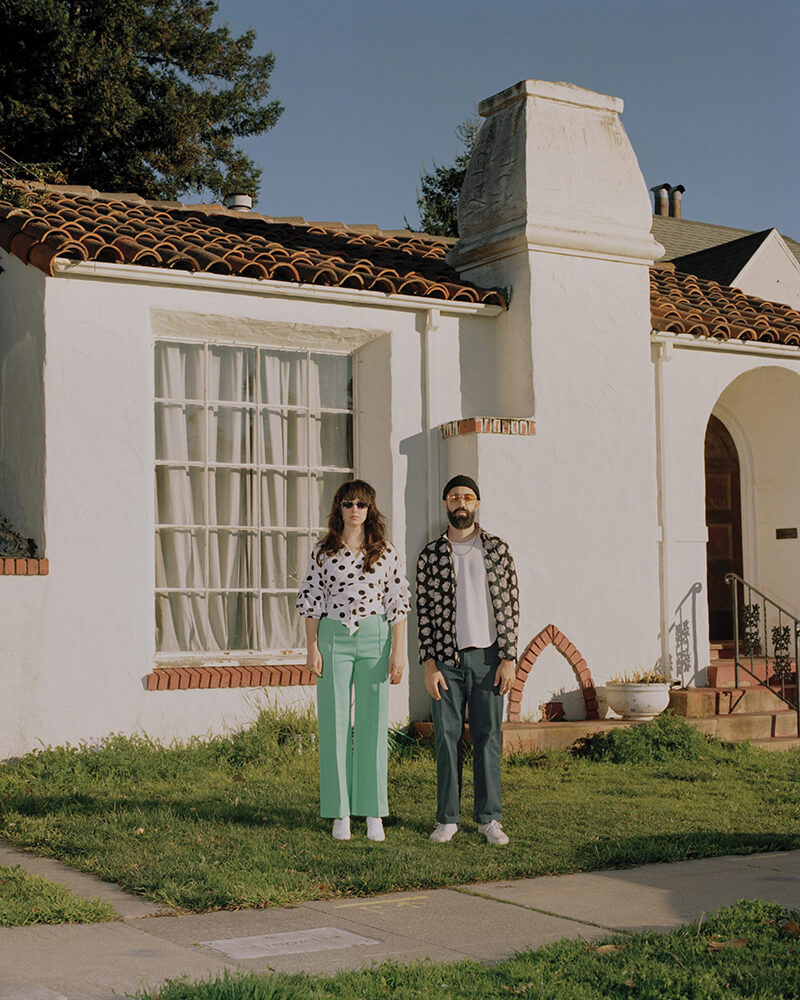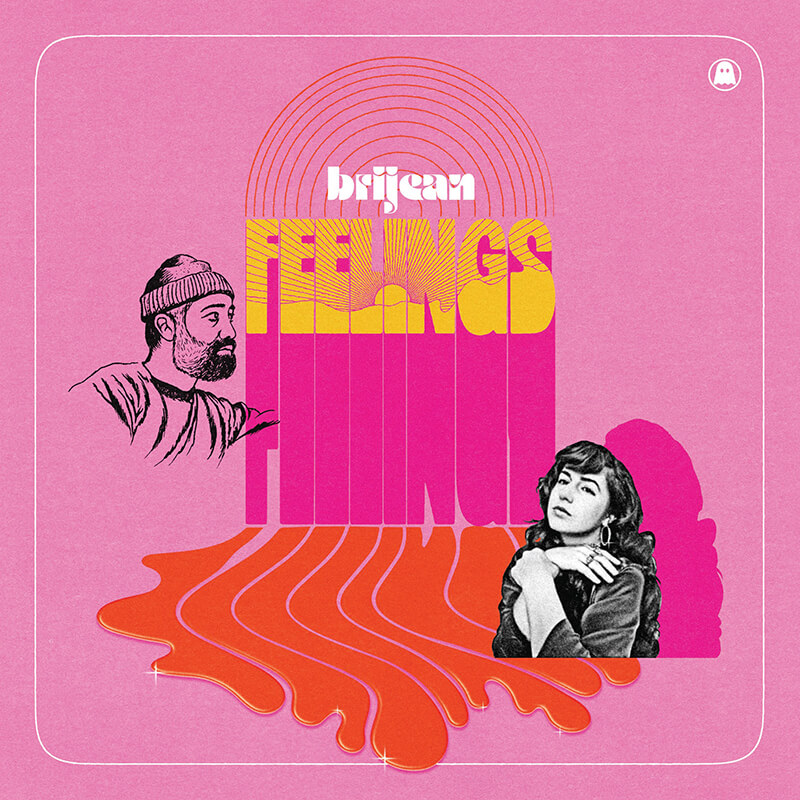Oakland-based duo Brijean is a perfect example of the kind of group that could only be a product of our times.
Started in 2018 as a side project of percussionist Brijean Murphy and bass player Doug Stuart, the collaboration initially sought, among other things, to provide the couple with an opportunity to spend some time together during breaks from their busy touring schedules.
The daughter of accomplished conguero and long-time Tito Puente and Harry Nilsson collaborator Patrick Murphy, Brijean is one of the most in-demand percussionists currently on the scene. Before the pandemic, she split her time between stints backing household names like Poolside and Tory Y Moi and indie-pop avant-gardists U.S. Girls. For his part, Stuart juggled rhythm duties with Bay Area psychedelic R&B band Bells Atlas, ambient-pop sextet Meerna, and a solo project under the moniker Dougie Stu.
Less than a year after their initial sessions, the duo released their debut EP Walkie Talkie, a richly-layered and organic tableau vivant of pulsing rhythms, colorful harmonies, and ethereal arrangements. Encouraged by the experience, the band set out to record a full-length album, this time enlisting the help of friends and fellow indie insiders such as Toro Y Moi band leader Chaz Bear, Astronauts, etc. keyboardist Anthony Ferraro, and Tune-Yards collaborator drummer Hamir Atwal. The result is Feelings, an ebullient medley of danceable numbers that comes as a timely corrective to the growing feeling of angst that’s come to characterize most of the past year, and that’s out on February 26th on Ghostly International.
I spoke with Murphy and Stuart about their new album, the role of their influences on their sound, and what they see as the next step for their project.
You guys have been playing together since 2018. Where and when did you meet, and how did you decide to collaborate musically?
Doug: We met because we were both playing in bands in the Bay Area, touring and sharing a bill in Davis, CA for a little college town gig and we hit it off. We started dating, and at the time we had different schedules because we were both touring a lot with different groups. We really wanted to collaborate as a way to spend some more time together. So that was the impetus for making the group. Also, Brijean really wanted to explore songwriting.
Brijean: Yeah, I wanted to put my voice to a project which is something that I’d never done. I had only backed other bands for my entire career, so it felt like something that I was ready to do, and Doug was the perfect collaborator and my roommate so it worked out perfectly.

How long were you a band before you put out your first record Walkie Talkie? Can you tell me a little bit about what that process was like?
Brijean: We weren’t a band before Walkie Talkie. We just kind of made an album together and then played a couple of shows after we put it out right before the pandemic hit. We really just formed the band through a recording project together.
Doug: We had made a few demos and this label in the Bay Area heard them and wanted us to make an album from them. We hadn’t played any shows or anything and had really only spent a little bit of time making those demos, so once we had an incentive to make the record, we just did it really quick in a month, and then we were a band.
Brijean, your father was a conga and keyboard player for Tito Puente and Harry Nilsson and would often have his band over the house to practice. What was it like growing up surrounded by so many talented musicians? And how much did that influence your decision to pursue music as you got older?
Brijean: Growing up in that environment was super fun. There were great parties, and I got to learn from a young age. It was that household where there would be a lot of kitchen jams, and somebody would say, “OK, grab that clave and just hold that one beat.” That was kind of my introduction to music. And then when one of my dad’s best friends passed away, I inherited his congas. I was 12 or 13 but didn’t start playing till…I joined my first band in college, and I think I found a new appreciation for my upbringing and for how supportive that musical family and household was for me.
Who would you list as some of your main influences growing up?
Brijean: I grew up listening to Erykah Badu and Fiona Apple. But I also listened to a lot of Tito Puente and Radiohead.
Doug: I feel like I’ve gone through a lot of phases. I actually took an academic route through music. I did a lot of learning in school but also checking out different albums and periods of music in a sort of regimented way for a long time. In high school, I was really into ’60s jazz like Miles Davis and John Coltrane, Eric Dolphy, Ornette Coleman, and that obsession with jazz kind of continued through college. I was actually mostly an upright bass player at that point, and when I moved to the Bay Area after college I started getting into Fela Kuti and some Latin jazz stuff. Then a lot of newer hip-hop that I hadn’t been really checking in with, so it feels like a pretty broad scope.
And you got to study Jazz at the University of Michigan under Geri Allen, correct? Can you tell me a bit about that?
Doug: Yeah, she was a professor there along with Bob Hurst. I’m a bass player first, so I was studying bass. Geri Allen was a combo teacher and I played in a number of combos where she was our coach. She was an amazing presence to be around. Super quiet, intense energy. The type of professor where you didn’t want to show up unprepared.
How do all of these different influences shape the music you currently make?
Doug: We rarely go into writing or recording sessions with a specific thing that we try to channel, but I feel like we’re kind of constantly drawing from all of our influences.
Brijean: And also our past experiences. I still play patterns and lessons that I learned as a kid. Some of those patterns were passed down through my dad and different percussionists. So I feel like that’s all still very much present.
What do you seek to explore and communicate in your music?
Doug: We definitely want to make music that people can dance to. But we want it to feel like it’s not all just coming from a drum machine and a sequencer. We want it to feel like it has some roots, that it has some influence from jazz harmonies and Latin rhythms.
Brijean: I want to keep growing as a musician. With “Ocean,” our most recent single, that’s not totally a dance hit. But it’s percussive and draws from a lot of different genres, and ideally it speaks to someone listening and feels like a comforting and lush space.

Let’s talk about your upcoming album, Feelings. How did it come about? Did you record it during lockdown and what was that process like?
Brijean: It was mainly recorded before quarantine with some friends at their studio in Oakland. We just played some music for a couple of days and jammed on different feels, then took that and built songs over them. When the pandemic hit and we were back at home, I felt very much in the head space that the album was definitely tilted towards light. That’s like my coping mechanism for existence, feeling like, “Yeah, things can get super gnarly right now, but let me just go to the good feels and try to hold on to that.” So we wrote another song in that same headspace called “Paradise” during the pandemic, and it worked its way into the album.
Did you find this process different from when you recorded Walkie Talkie? Was it easier to translate your ideas onto the record?
Brijean: Yeah, I think so.
Doug: I think that it differed in the sense that we wanted to bring in more people, whereas in Walkie Talkie we did everything ourselves. On this record we wanted to involve some of our friends. Having that jam session before we started writing helped open up the sound and expand on what was already there. Bringing in some people later to overdub things just made it a little more dynamic.
Coming from a percussive background, what’s your approach to songwriting? Do you put more of an emphasis on the music or the lyrics?
Brijean: Almost always we start with percussion and drums and then build off that feel. Then we add bass and harmony.
Doug: Usually, Brijean writes melodies and lyrics much later in the process, almost last. Occasionally, we’ll go back and sculpt around what she came up with. But oftentimes, a large part of the song like the chords, rhythm, and bass are already there.
How would you describe the jump from being a touring musician in someone else’s band to being a songwriter?
Brijean: It’s super enriching, and it’s such a great pleasure to have such a great partnership and creative control over something. It’s just awesome, I love it.
How have you been promoting the album? Have you done any live streams?
Doug: We haven’t done any live streams yet; we’re rehearsing a lot right now. We have our first one on [February] 25th, the day before the album comes out. We’re doing it with Bands in Town, and we’ll likely have some more after the record comes out. We’ve been promoting the album with some visual components and Brijean animated a music video for our last single before the release, “Hey Boy.”
What’s on the horizon once live music becomes viable?
Doug: We’re definitely hoping to be touring when the world is fit to have shows again. That’s definitely a priority for us at this point.

What do you see as your next step?
Brijean: We’re gonna work on more music, projects and weekly goals. We’re thinking about doing collaborations and a couple of remixes for people, a couple of DJ sets; a couple of live streams. We’re also thinking of working on another EP, and we’re about to film another music video.
Doug: And touring. We’re excited to do that as well.
Any particular artists you’d like to collaborate with in the near future, or any festivals or venues that you’d like to play?
Brijean: Hollywood Bowl, for sure. And I don’t know there are too many artists.
Doug: I would love to work with Solange, and I’d love to play Coachella. That seems pretty far-fetched right now, but you know, dream big.
Follow on Instagram @heybrijean
photos by Jack Bool
